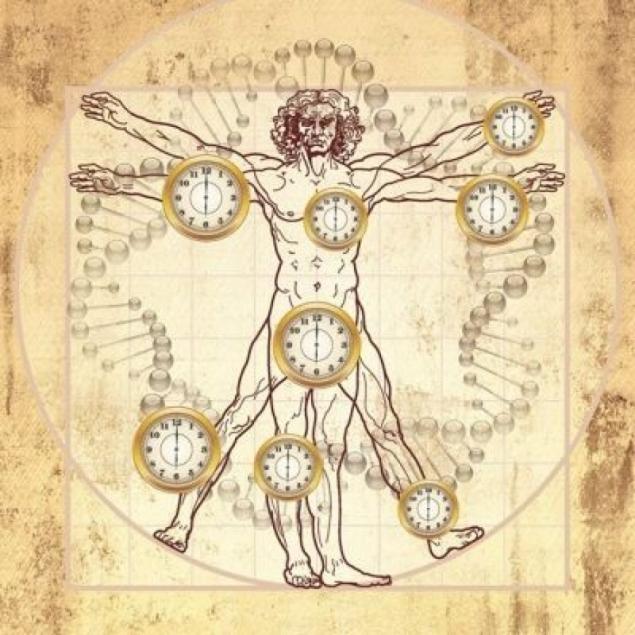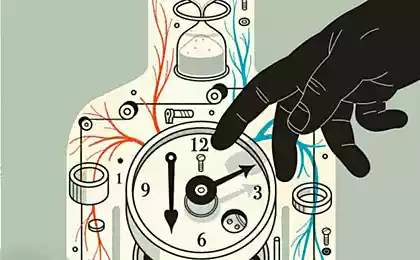655
Crib on your biorhythms: body organs activity, depending on the time of day
Daily biorhythms MAN AND HIS SON
The human body - a real symphony orchestra. Incredible coordinated work of all its organs, we are often not even aware of tissues and cells to the end. All of the processes occurring in our body are very complex and sonastraivaemy. One of the amazing features of our body is a set of changes that are called biorhythms.
So biorhythm - a periodic rise and fall changes the activity of biological processes that are independently supported and independently reproduced in any conditions
. It's no secret that nature is cyclical. These cycles are of different duration: daily, annual, lunar month, etc. Change of day night, the seasons, the passage of the moon around the planet - all this is the original terms of the existence of all living things on this earth, because, of course, biorhythms are not unique to humans but also to other living organisms. Closing the night flower buds, hibernating bears, ants, closes the entrance to the nest - all these are examples of biorhythms associated with a change natural cycles
.
Cyclical characteristic of all biological systems, and this is due to the fact that none of the processes can not last indefinitely, must follow a break, during which there is rest, recovery and accumulation of forces. For every living organism alternating periods of maximum and minimum is much more efficient and economical than the long-term maintenance functions on the average level of intensity.
This is a very important point, because the high efficiency of human life is directly connected with his biorhythm. Physical activity should fall into periods, the most contributing. If you become tense during the downturn phase, nothing good will come of it. As well as trying to sleep in the period of maximum activity. Each biorhythm characterized by the following criteria: period, frequency, phase and amplitude
. biorhythm period - this is the duration of one cycle of change per unit time (eg, 24 hours duration daily biorhythm.)
biorhythm frequency - the frequency of periodic processes per unit time
. Phase biorhythm - biorhythm of the period per unit time (the initial phase, the active phase, etc.)
The amplitude of the jet lag - the scope of activity during the period of oscillation biorhythm
. For a man characterized by a myriad of biological rhythms: this cell periods and cycles of blood, and breath, and diurnal variation and seasonal. And the most amazing thing in all this is that there is a very fine synchronization, frequency and consistency between the different biorhythms duration.
In this article, we will pay the greatest attention to the daily biorhythm, which is reflected in the changing phases wakefulness - sleep
. Before you average daily human biorhythm:
4-5 o'clock in the morning (according to your real-time geographic location) - preparing the body to wake up. The gradual build-up of life activity.
5 am - reduced production of melatonin, a gradual increase in body temperature, increase in production activity of hormones, increased adrenalin level of hemoglobin and sugar, increased heart rate, high blood pressure. All this is enhanced by the action of the rising street noise, ambient light changes, temperature changes. Please note that the preparation of the body and the activity is in the time that the majority considers a deep sleep.
6 am - production of cortisol by the adrenal glands, which is also called "awakening hormone". It was at this time and there is the awakening of your physiological, the best time to start a new day, if you bear a bed in accordance with the daily biorhythms.
From 7 to 9 am - Charging time of morning exercise, physical activity. And then you choose a nice system of values. Orthodox medicine and nutritionists say that it was at that time must account for your breakfast. The modern biochemistry and biorhythmology insist that from 4am to 12 days the body passes the self-cleaning step, because it should not interfere in this matter for the sake of health and should not eat up to 12 h. Of the day, only drink.
9 am - high mental activity, good performance (but only if you woke up in time to have those who are barely opened his eyes at 8 o'clock and do not actively work out, it will be difficult to find high performance at 9 am.), Works well short-term memory. It's time to learning new information, do not load themselves physically.
9-10 hours - the planning and easy holiday
. 9-11 hours - strengthen your immune system, because it is competent doctors at that time appoint medications that increase the body's resistance to disease
. 12 hours - reduce your physical activity, if they do occur. At this time it is reduced and mental activity, blood slowly flows to the digestive organs, as (As stated above) 12 hours - the optimal time for receiving pischi.Tonus muscles, heart rate and blood pressure decrease
. 13 hours - lunch break for orthodox medicine supporters. End for dinner biorhythmology supporters.
13-15 hours - rest. Not just in the southern countries, it is necessary at this time siesta. In the Nordic countries, where the afternoon sun is not so active and does not interfere with wakefulness, yet also reduced activity in this period, the body is busy mastering prepared meals. During this period, about 14 hours there is minimum pain sensitivity, because the most effective analgesic action. Very convenient, for example, to visit the dentist at the time.
15 hours - the maximum long-term memory activity
. 16 hours - once lifting performance
. 16-19 hours - high physical activity. The ideal time for sports. Also, the high intellectual activity. Those who stay at work at that time, as a rule, quickly and successfully complete the case.
19 pm - dinner (can be a little earlier, but not later). The preferred carbohydrate foods. Conservation is still high and the reaction activity.
After 20 hours of mental condition stabilizes, improves memory. After 21 hours of almost 2-fold increased number of white blood cells (increased immunity), the body temperature drops, cell renewal continues.
From 20 to 21 hours - evening walks are recommended, light exercise
. 21-22 hours - preparing the body for a night rest, drop in body temperature and pressure, slowing of body functions
. 22 hours - the immune system is in the active phase, to the maximum to protect you while you sleep. It was at 22 hours, you should go to bed. Just systematic jet lag leads to a weakening of the body, diseases and psychological discomfort.
22-2 am - Update cells. Susceptibility to depression in people who are chronically sleep at this time of day.
3-4 o'clock in the morning - the deepest sleep, the lowest level of activity of hormones during the day, the lowest body temperature. The period during which the physical activity is the worst effect on the body.
As you can see, biorhythm - are stubborn things. He is indifferent to your work schedule, your passions and weaknesses. How would you justify or his regime, the dream is to fall for the period from 22 to 6 hours. Otherwise you daily to undermine their own power.
Also interesting:
20 little-known facts about the human body
The unique recipe of youth: a complete upgrade of the organism
The life of modern man has put a lot on its head, and often in spite of having the opportunity, we are still in force perennial habits continue to stay awake during the physiological activity of the recession and to sleep in a period of high activity of the body, losing the best opportunity.
Remember that, with what started our article: the human body - the orchestra, the exact mechanism is synchronized with a variety of functions. And the long-term coherence of this mechanism depends on you, on the rational use of its own forces, the timely sleep and rest.
The human body - a real symphony orchestra. Incredible coordinated work of all its organs, we are often not even aware of tissues and cells to the end. All of the processes occurring in our body are very complex and sonastraivaemy. One of the amazing features of our body is a set of changes that are called biorhythms.
So biorhythm - a periodic rise and fall changes the activity of biological processes that are independently supported and independently reproduced in any conditions
. It's no secret that nature is cyclical. These cycles are of different duration: daily, annual, lunar month, etc. Change of day night, the seasons, the passage of the moon around the planet - all this is the original terms of the existence of all living things on this earth, because, of course, biorhythms are not unique to humans but also to other living organisms. Closing the night flower buds, hibernating bears, ants, closes the entrance to the nest - all these are examples of biorhythms associated with a change natural cycles
.

Cyclical characteristic of all biological systems, and this is due to the fact that none of the processes can not last indefinitely, must follow a break, during which there is rest, recovery and accumulation of forces. For every living organism alternating periods of maximum and minimum is much more efficient and economical than the long-term maintenance functions on the average level of intensity.
This is a very important point, because the high efficiency of human life is directly connected with his biorhythm. Physical activity should fall into periods, the most contributing. If you become tense during the downturn phase, nothing good will come of it. As well as trying to sleep in the period of maximum activity. Each biorhythm characterized by the following criteria: period, frequency, phase and amplitude
. biorhythm period - this is the duration of one cycle of change per unit time (eg, 24 hours duration daily biorhythm.)
biorhythm frequency - the frequency of periodic processes per unit time
. Phase biorhythm - biorhythm of the period per unit time (the initial phase, the active phase, etc.)
The amplitude of the jet lag - the scope of activity during the period of oscillation biorhythm
. For a man characterized by a myriad of biological rhythms: this cell periods and cycles of blood, and breath, and diurnal variation and seasonal. And the most amazing thing in all this is that there is a very fine synchronization, frequency and consistency between the different biorhythms duration.
In this article, we will pay the greatest attention to the daily biorhythm, which is reflected in the changing phases wakefulness - sleep
. Before you average daily human biorhythm:
4-5 o'clock in the morning (according to your real-time geographic location) - preparing the body to wake up. The gradual build-up of life activity.
5 am - reduced production of melatonin, a gradual increase in body temperature, increase in production activity of hormones, increased adrenalin level of hemoglobin and sugar, increased heart rate, high blood pressure. All this is enhanced by the action of the rising street noise, ambient light changes, temperature changes. Please note that the preparation of the body and the activity is in the time that the majority considers a deep sleep.
6 am - production of cortisol by the adrenal glands, which is also called "awakening hormone". It was at this time and there is the awakening of your physiological, the best time to start a new day, if you bear a bed in accordance with the daily biorhythms.
From 7 to 9 am - Charging time of morning exercise, physical activity. And then you choose a nice system of values. Orthodox medicine and nutritionists say that it was at that time must account for your breakfast. The modern biochemistry and biorhythmology insist that from 4am to 12 days the body passes the self-cleaning step, because it should not interfere in this matter for the sake of health and should not eat up to 12 h. Of the day, only drink.
9 am - high mental activity, good performance (but only if you woke up in time to have those who are barely opened his eyes at 8 o'clock and do not actively work out, it will be difficult to find high performance at 9 am.), Works well short-term memory. It's time to learning new information, do not load themselves physically.
9-10 hours - the planning and easy holiday
. 9-11 hours - strengthen your immune system, because it is competent doctors at that time appoint medications that increase the body's resistance to disease
. 12 hours - reduce your physical activity, if they do occur. At this time it is reduced and mental activity, blood slowly flows to the digestive organs, as (As stated above) 12 hours - the optimal time for receiving pischi.Tonus muscles, heart rate and blood pressure decrease
. 13 hours - lunch break for orthodox medicine supporters. End for dinner biorhythmology supporters.
13-15 hours - rest. Not just in the southern countries, it is necessary at this time siesta. In the Nordic countries, where the afternoon sun is not so active and does not interfere with wakefulness, yet also reduced activity in this period, the body is busy mastering prepared meals. During this period, about 14 hours there is minimum pain sensitivity, because the most effective analgesic action. Very convenient, for example, to visit the dentist at the time.
15 hours - the maximum long-term memory activity
. 16 hours - once lifting performance
. 16-19 hours - high physical activity. The ideal time for sports. Also, the high intellectual activity. Those who stay at work at that time, as a rule, quickly and successfully complete the case.
19 pm - dinner (can be a little earlier, but not later). The preferred carbohydrate foods. Conservation is still high and the reaction activity.
After 20 hours of mental condition stabilizes, improves memory. After 21 hours of almost 2-fold increased number of white blood cells (increased immunity), the body temperature drops, cell renewal continues.
From 20 to 21 hours - evening walks are recommended, light exercise
. 21-22 hours - preparing the body for a night rest, drop in body temperature and pressure, slowing of body functions
. 22 hours - the immune system is in the active phase, to the maximum to protect you while you sleep. It was at 22 hours, you should go to bed. Just systematic jet lag leads to a weakening of the body, diseases and psychological discomfort.
22-2 am - Update cells. Susceptibility to depression in people who are chronically sleep at this time of day.
3-4 o'clock in the morning - the deepest sleep, the lowest level of activity of hormones during the day, the lowest body temperature. The period during which the physical activity is the worst effect on the body.
As you can see, biorhythm - are stubborn things. He is indifferent to your work schedule, your passions and weaknesses. How would you justify or his regime, the dream is to fall for the period from 22 to 6 hours. Otherwise you daily to undermine their own power.
Also interesting:
20 little-known facts about the human body
The unique recipe of youth: a complete upgrade of the organism
The life of modern man has put a lot on its head, and often in spite of having the opportunity, we are still in force perennial habits continue to stay awake during the physiological activity of the recession and to sleep in a period of high activity of the body, losing the best opportunity.
Remember that, with what started our article: the human body - the orchestra, the exact mechanism is synchronized with a variety of functions. And the long-term coherence of this mechanism depends on you, on the rational use of its own forces, the timely sleep and rest.























